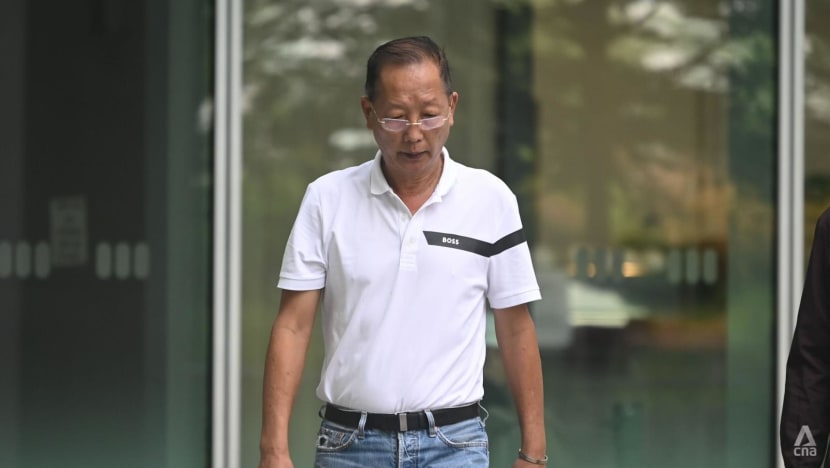Jail for former CEO who gave MOM false information to get work passes for his companies' foreign investors
The Ministry of Manpower's prosecutors said that in allowing foreigners to get work passes in Singapore without any intention for them to work for him, Chu Sau Ben got involved in the very mischief that the Employment of Foreign Manpower Act seeks to prevent.

Chu Sau Ben pictured at the State Courts on Jun 9, 2025. (Photo: CNA/Syamil Sapari)

This audio is generated by an AI tool.
SINGAPORE: In exchange for investment funds, the former chief executive officer of a building solutions company agreed to apply for employment passes for two foreigners under his firm and its subsidiaries.
While doing so, he submitted false statements to the Ministry of Manpower (MOM) in relation to the hiring of the two foreigners.
Chu Sau Ben, 59, who helmed Libra Group Limited, was sentenced to a five-week jail term on Monday (Jun 30) after pleading guilty to a charge under the Employment of Foreign Manpower Act. Two other charges were taken into consideration for his sentencing.
He served as director of Libra Group Limited, Libra Engineering and Libra Building Construction from 1997 until 2020. He was also CEO and executive chairman of these companies at the time of the offences.
Through its subsidiaries, Libra Group Limited mainly provided mechanical and electrical engineering services as a sub-contractor such as the installation of air-conditioning, electrical and plumbing systems.
In 2018, his companies began facing financial difficulties and he sought funds from investors in a bid to expand the business overseas.
The next year, he was introduced to a woman named Wang Jie, a director of Hai Sin International, which was in the business of helping clients buy over, invest in or start businesses in Singapore. It also engaged in programmes in China to persuade foreigners to invest in Singapore.
Wang told Chu that she would be able to introduce people who could invest in his companies, but in return, he would have to pledge part of his shares in his companies to these people in addition to applying for employment passes for them. Chu agreed.
Wang is facing similar charges under the Employment of Foreign Manpower Act and her case is pending before the courts.
She referred two foreigners by the names of Liu Lei and Chen Bingchuan to Chu. Both foreigners had no intention of working in Singapore and just wanted to legalise their entry and residence in the country.
Chu's companies received S$2 million (US$1.6 million) from Chen and no less than S$1 million from Liu in exchange for applying for their work passes.
Chu agreed to apply for an employment pass for Liu under Libra Engineering and Liu pre-paid S$360,000 to Wang for his purported monthly salary of S$10,000 a month for 36 months.
On Aug 15, 2019, a declaration form for Liu's employment pass was submitted to MOM. This form falsely stated that Liu would be employed by Libra Engineering as a regional project manager.
The form was signed by Libra Engineering's general manager under Chu's instructions.
Liu's employment pass was approved, but investigations showed that he was never employed and never performed any work for the company.
Chu and Liu did not keep in contact and Chu did not know what Liu was doing.
MOM's prosecutors Amos Tan and Khong Zi-Wei sought six to eight weeks' jail for Chu.
They said that Chu's offence "involves the very mischief that the Employment of Foreign Manpower Act seeks to prevent" and that he allowed a foreigner to obtain a work pass without any intention for the person to work for the employer declared in the pass.
"At the outset, the accused’s intention ... was for the sole purpose of receiving financial gains," the prosecutors added in calling for a deterrent sentence.
They also said that the offences were discovered only around two years later and after comprehensive investigations by MOM, which highlighted the difficulties in detecting the crime.
For making a false statement to the Controller of Work Passes, Chu could have been jailed for up to two years or fined up to S$20,000, or both.









